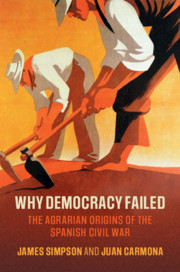Book contents
- Why Democracy Failed
- Cambridge Studies in Economic History
- Why Democracy Failed
- Copyright page
- Dedication
- Contents
- Figures
- Maps
- Tables
- Acknowledgements
- Notes on the Regional Division of Spain
- Abbreviations
- Introduction
- Part I The European Experience: Economic and Political Development, 1870–1939
- Part II Spanish Agriculture, Economic Development, and Democracy
- Part III Explaining the Weakness of the Family Farm
- 5 The Family Farm and the Limits to Village-Level Cooperation
- 6 The Persistence of the Landed Elites and the Nature of Farm Lobbies
- Part IV Rural Elites, Poverty, and the Attempts at Land Reform
- Part V Rural Conflicts and the Polarization of Village Society
- Book part
- Glossary
- Bibliography
- Index
5 - The Family Farm and the Limits to Village-Level Cooperation
from Part III - Explaining the Weakness of the Family Farm
Published online by Cambridge University Press: 17 April 2020
- Why Democracy Failed
- Cambridge Studies in Economic History
- Why Democracy Failed
- Copyright page
- Dedication
- Contents
- Figures
- Maps
- Tables
- Acknowledgements
- Notes on the Regional Division of Spain
- Abbreviations
- Introduction
- Part I The European Experience: Economic and Political Development, 1870–1939
- Part II Spanish Agriculture, Economic Development, and Democracy
- Part III Explaining the Weakness of the Family Farm
- 5 The Family Farm and the Limits to Village-Level Cooperation
- 6 The Persistence of the Landed Elites and the Nature of Farm Lobbies
- Part IV Rural Elites, Poverty, and the Attempts at Land Reform
- Part V Rural Conflicts and the Polarization of Village Society
- Book part
- Glossary
- Bibliography
- Index
Summary
This chapter looks at the nature and extent of collective action in rural areas, and the difficulties associated with creating credit and producer cooperatives. It shows that the traditional village economy provided a wide variety of public goods, and the persistence of the pósitos, or village grain banks, suggests an ability to organize and resolve problems of collective action that extended over most of the country, and not just the North, as assumed in much of the literature. However, although the village pósito met the needs of a traditional, organic-based farming system, it was inadequate for an agriculture that was becoming increasingly dependent on industrial inputs. In particular, it was the inability to create an organizational structure that could extend collective action from the village to the regional and national levels, and attract savings from a wide geographic area to meet the growing needs of the small farmers that helps explain the persistence of paternalist relations in the countryside. The chapter finishes by providing a background to the changing nature of Spain’s farm organizations over the half century prior to the Second Republic.
- Type
- Chapter
- Information
- Why Democracy FailedThe Agrarian Origins of the Spanish Civil War, pp. 107 - 127Publisher: Cambridge University PressPrint publication year: 2020

